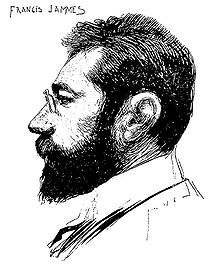Francis Jammes
Francis Jammes (born December 2, 1868 in Tournay , Hautes-Pyrénées , France ; † November 1, 1938 in Hasparren , Pyrénées-Atlantiques ) was a French poet .
Life
Jammes spent most of his life in his native region around Béarn as well as in the Basque Country and also incorporated his homeland into his literature. His first poetic attempts circulated in Parisian literary circles from 1895. He was best known for his fresh and full poetry, which began a poetic renewal that broke with the symbolist tendencies of his era. He often met other poets, especially André Gide , with whom he was in Algeria in 1896 , as well as Mallarmé and Henri de Régnier . Later he was also influenced by Paul Claudel .
His most famous collection, De L'angélus de l'aube à l'angélus du soir , appeared in the Mercure de France in 1897 , Le Deuil des Primevères (1901) was also well received. He had previously worked as a notarial assistant, but from now on he was able to live from his literature. In 1905 he converted to Catholicism, encouraged by Claudel, and his poetry became more religious and dogmatic.
Jammes was never really recognized in the Parisian circles. He was considered a provincial who lived lonely and withdrawn in the Pyrenees mountains. He tried several times to be admitted to the Académie française , but his application was rejected each time.
Jammes also provided the template for Georges Brassens ' song La Prière . It is an excerpt from his poem Les mystères douloureux from the collection L'église habillée de feuilles (1906). Brassens changed a few words to make the text more rhythmic.
Works (selection)
Poetry
- De l'Angélus de l'aube à l'Angélus du soir (1898)
- Le Deuil des primevères (1901)
- Le Triomphe de la vie (1906)
- Les Géorgiques chrétiennes (1911–1912)
- Le Livre des quatrains (1923–1925)
- De tout temps à jamais (1935)
- Sources (1936)
prose
- Clara d'Ellébeuse (1898)
- Almaïde d'Étremont (1901)
- Le roman du lièvre (1903)
- Pomme d'anis (1904)
libretto
- La Brebis égarée. Roman musical (opera). Music (1910–1914): Darius Milhaud . Premiere 1923
Web links
- Official site (French)
- Literature by and about Francis Jammes in the catalog of the German National Library
- Works by and about Francis Jammes in the German Digital Library
- Works by Francis Jammes in the Gutenberg-DE project
| personal data | |
|---|---|
| SURNAME | Jammes, Francis |
| BRIEF DESCRIPTION | French poet |
| DATE OF BIRTH | December 2, 1868 |
| PLACE OF BIRTH | Tournay |
| DATE OF DEATH | November 1, 1938 |
| Place of death | Hasparren |


